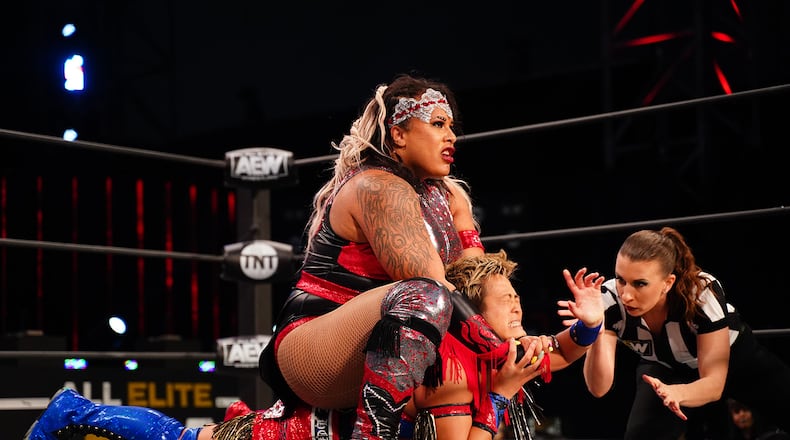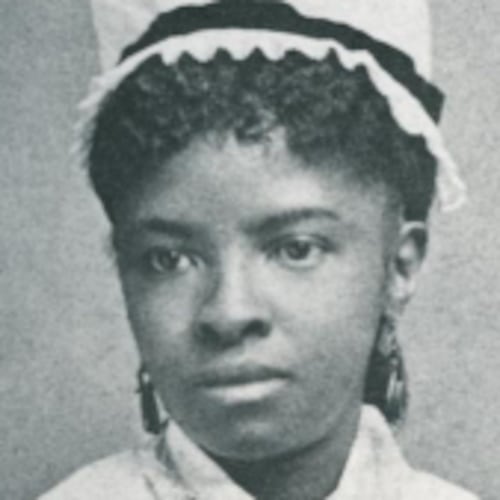Successful artists capture storytelling’s most powerful and evocative elements: Inherent injustice, using comedy in the face of tragedy, overcoming all those odds. It all starts with the Bible — Good versus Evil. Themes are as complicated as humans: Fast versus slow, big versus small, educated versus ignorant.
“When you add the psychology element to pro wrestling and how to get to the end with everyone going on an emotional ride,” said Mark Henry, a former world champion and current announcer.
Like Henry, some of this country’s ultimate storytellers are Black professional wrestlers.
Equal parts show biz and bulging biceps, wrestling uses acting and athleticism to tell universal truths.
Wrestling can be an alphabet soup with a lot of organizations and players. The World Wrestling Entertainment (WWE) is what you probably think of when someone mentions wrestling.
Even if you don’t care about what may be the ultimate form of human storytelling, maybe you care about money: The publicly traded WWE brought in $180.4 million in net income during 2021, according to its federal 10-K filing.
Then there’s the upstart All Elite Wrestling (AEW) that airs on TNT. The Atlanta Journal-Constitution asked three notable Black performers with AEW — Henry, Nyla Rose and Keith Lee — about African-American wrestlers’ contributions.
“How boring is boxing?” said Nyla Rose, a professional wrestler. “You get in there and you just beat each other for what? Give me a story behind that ... You get personalities larger than life, you get reasons they are beating the snot out of each other and who doesn’t enjoy that?”
With true irony, professional wrestling masquerades as a meritocracy but is actually scripted to tell whatever story the overlords want.
AEW promised to diversify and then elevate non-traditional stories told through wrestling. While it has received some serious criticism for living up to that promise, AEW has undoubtedly progressed the industry.
Rose is not only a Black woman and the first openly transgender wrestler, but she was AEW’s second woman’s champion.
She said Black identity has told incredible wrestling stories.
“We hit, we tease, we bring to light,” Rose said. “You reflect a lot of society in your art, in your performances.”
She credits her mother for her artistic eye but also her attitude: “Do no harm, but take no (expletive). That’s my mom.”
When asked, she also mentioned the Nation of Domination — a stable of Black wrestlers who evoked militant Black Panther and Nation of Islam themes to assert dominance in the ring.
“At the time, they were being painted as the villains, as the bad guys, but a lot of what they were say I was like ‘I couldn’t boo these people’,” Rose said. “They were the heroes of their own story.”
One of those heroes was Mark Henry, a member of the Nation.
Henry, an Olympic powerlifter who won the title of “World’s Strongest Man,” became the fourth Black WWE world champ in 2008. The Texan brought the rare Southern accent to primetime television.
It took him four years, but Henry said he created a list of the top 50 African-American wrestlers for his podcast Busted Open.
Jim Mitchell, who went by the moniker of Black Panther, broke the color line with flamboyance in the early 1930s before television was widely available, Henry said.
Then came the legendary Ernie Ladd along with Bobo Brazil, who according to the WWE, participated in the first racially mixed match in Atlanta when Brazil teamed with El Mongol to take on Mr. Ito and the Great Ota in October 1970. The Constitution months later referred to him as “one of the world’s leading wrestlers.”
Credit: Archive
Credit: Archive
The story of the Nation was told over the span of four years. When it ended, all the members blossomed, including Dwayne Johnson — The Rock is now the highest paid actor in Hollywood and WWE’s first Black champion.
Ask anyone about the next generation of Black wrestlers and they’ll mention Keith Lee. He promotes himself as limitless. But he told the AJC it’s more than a gimmick.
“We’re all humans,” said Lee, who played for Texas A&M’s football team. “We as individuals, not just people of my skin color, we all bring something different.”
He got his love of wrestling from his late grandmother. Lee remembers her shouting at the television.
“A lot of things in terms of art is an emotional connection and I feel, like any artform, (wrestling can) make people feel special or inspire them or motivate them to do something better for themselves,” he said.
Credit: Lane Walbert
Credit: Lane Walbert
Rose, Henry and Lee all had something in common. When asked who’d be on their Mount Rushmore of Black wrestlers, only one impression made all of their lists: Ron Simmons, the first worldwide Black professional wrestling champion.
Simmons was a star football player out of Warner Robins High School and shocked the recruiting world in the late 1970s when he elected to play at nose guard for the Florida State University’s fledgling program. The team went 39-8 during his four years. His number, No. 50, was the first defensive number retired at Florida State.
He moved on to wrestling, where he had a stellar singles run and eventually headed up the Nation of Domination. He was inducted into the WWE Hall of Fame in 2012.
Credit: Ed Webster
Credit: Ed Webster
In a WWE interview released days ago, Simmons answered said why he though more Black wrestlers didn’t get into the business: “When they were looking at it from the television standpoint, they wasn’t viewing Black people. And when they did view them, Steve, they were beating them. They were in some other subservient role or any kind, still with the stereotypical stuff ... so that’s a deterrent.”
“Things were rough, very rough,” Simmons said. “And it wasn’t due to my work or anything in the ring, it had to do with my race. It got like that.”
About the Author
The Latest
Featured





